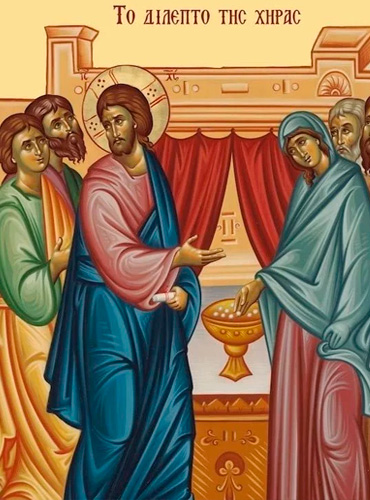Saturday of the Ninth Week in Ordinary Time – Mk 12:38-44
A few years ago, researchers claimed to have calculated that it costs 1.1 million dollars to raise a child in the United States. My thought was, “Is that really all it costs? Only a million dollars?” Indeed, a million dollars seems rather cheap. The value of a child is far more than a million dollars, because they’re priceless, and because all the intangibles of being a parent, of waking up at night to care for them, praying for them, worrying about them, all those things have no price tag. It might be accurate to say the cost of raising a child is several hundred thousand dollars, or even a million, but we’d be wrong to say that’s the value of a child. The cost of something, and the value of something, are often quite different.
Today’s Gospel brings this difference to the forefront. We hear the story of the poor widow who put in her small offering for the Temple. To everyone else, the cost or the price of that gift was almost nothing, but Jesus, who sees the value, knows precisely what it is worth. There are two details that really call our attention: first, the widow puts in “two small coins,” and, second, the words that Jesus uses to describe her gift.
First, notice that the widow puts in “two small coins.” The Greek word used for the coin is λεπτόν (leptov), which literally comes from the verb to peel and is related to the word for scale (like, a fish scale). The name refers to the fact that the coin was very thin, a small copper coin, and worth hardly anything at all; Biblical scholars tell us that perhaps each coin was worth about one-eighth of cent; indeed, they were the smallest coins in use in Palestine at the time. Now, the widow could have very easily kept one of those two coins for herself, but she didn’t; she gave both, holding nothing back.
Second, Jesus describes her gift in this way: “she, from her poverty, has contributed all she had, her whole livelihood.” “[That] verse has a double meaning. The Greek word bios means both ‘life itself’ and ‘means of subsistence.’ There are two nuances, [two ways the phrase can be interpreted:] ‘She put in all the means she had to live on’ [but also] ‘She put in all the life she had.’” “She put in all the life she had.” Such words convey the depth of her gift and how much it really cost her, despite the low financial value. We could say that others would have seen the price of her offering, but only Jesus knew the value of it.
For us, the poor widow serves as an excellent example, and in two ways. First, although we might consider ourselves as good for very little, or of little use because we struggle with many things, nonetheless God asks that we surrender ourselves entirely in His service, holding nothing back for ourselves. The world, others, and even ourselves might see the price of our self-offering, but only Jesus knows the value of it. He asks us not just for things, but rather to “put in all the life we have.” In the words of Saint Paul in his second letter to the Corinthians, Christ “wants not what is yours, but you” (2 Cor 12:14). He “wants not what is yours, but you.” It’s good to give the things we have, but it is far more precious and valuable to give ourselves.
This is expressed beautifully by two very short anecdotes recounted by Fulton Sheen. First, “A woman visiting a neighbor said, ‘I would give my life to have two children like that.’ The mother answered, ‘That is exactly what it costs.’” Parents lay down their lives completely for their children.
Likewise, “a wealthy American visiting a leper colony in the Pacific came across a nun who was caring for about three hundred lepers, and said to her, ‘Sister, I wouldn’t do that for a million dollars.’ [To which] the sister replied, ‘Neither would I.’”[1] For the wealthy woman, that service wasn’t worth anything; for the sister, it was worth far more than a million dollars, because it was done for love of Christ.
Secondly, we’re reminded that we really need to trust in God and in His providence. The widow didn’t keep anything for herself, or worry about what tomorrow would bring. This is the way God wants to work with us, since this is what Divine providence is. Saint Thomas Aquinas says beautifully that God is “stationed as it were at the arce aeternitatis, the summit or mountaintop of eternity” (Peri. Herm., 14, 20), where He sees everything, and knows how to provide what we need. God’s Providence, His loving concern for us, is concrete, perhaps the most concrete and constant expression of His love for us, since it touches on absolutely every element of our lives.
Today, we can ask ourselves: do we really give ourselves in our vocations, or do we just give what we have? Do I really try to understand the value of things as God sees them, or do I settle for the world’s view and opinion? Do we really trust in God’s love for us, and especially in His providence?
Let us ask, through the intercession of Mary, Mother of Divine Providence, for the grace to really give ourselves entirely to God’s service, holding nothing back for ourselves, and thus become an offering worthy of God Himself.
[1] Fulton Sheen, Footprints in a Darkened Forest, 102.





